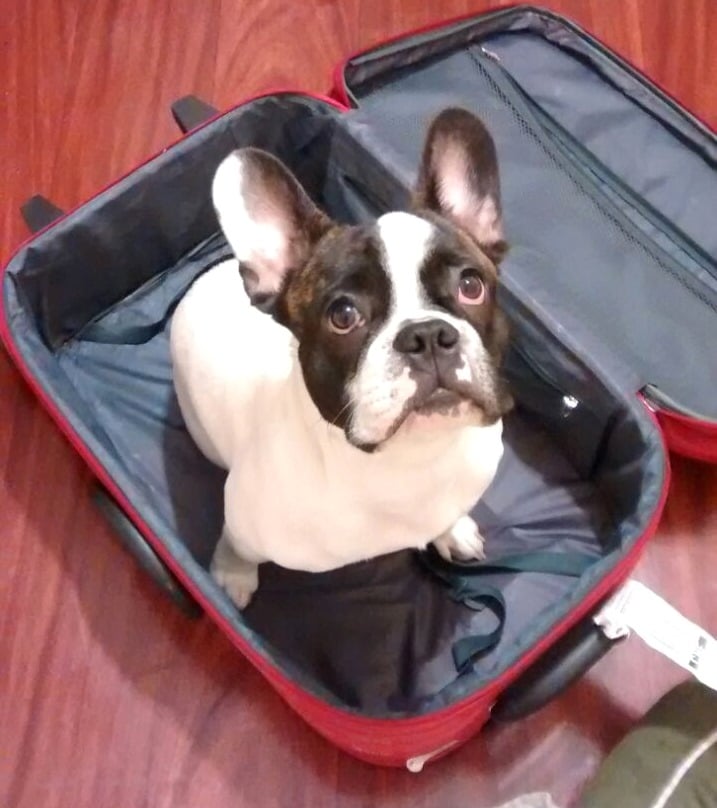5 Surprise Factors That Can Disrupt a Pet’s Original Move Plan
 International Relocation Coordinators Handle Pet Travel's Many Surprises
International Relocation Coordinators Handle Pet Travel's Many Surprises
Along with essential questions like "How do I move my pet from Point A to Point B?" and "How much will this cost?", we're often asked something else: "Why would I need to hire help with my pet's move -- can't I do it myself?"
The number one answer to this question involves the possibility of surprise developments in a pet move plan. When unexpected situations arise (and they often do), it's better to have an expert in charge who can keep your pet safe and on track for a happy reunion even in the midst of complications.
Weather delays, airline strikes, and simple bad luck can push an already stressful move into very uncertain territory, and if it's your first time handling such an event you probably won't know the best way to turn things around on your own.
We recently asked Linda, one of our experienced International Relocation Coordinators, to share a few specific instances in which she found herself dealing with the unexpected on behalf of her clients. Read on to find out how she gracefully saves the day when pet moves became extra complicated due to forces beyond our control.
How common is it for something (large or small) to affect an original move plan and require an adjustment? According to Linda, it's not unusual for an original plan to change, and many factors can affect a move date. Here are a few:
5 Surprise Factors That Can Disrupt a Pet's Original Move Plan
-
Weather is probably the #1 factor that can change a move plan. Depending on the season and port it can be a large possibility -- for example going out of ORD (Chicago) during winter months is likely to require some juggling.
-
New country requirements are less likely to be a factor, but when they are they can dramatically disrupt your whole plan.
-
Because the airline reserves the right to bump a pet for certain reasons, this can be a factor, too. This is for safety reasons; if another piece of cargo is boarded that would make the environment unsafe (dry ice or human remains, for example), the airline makes an adjustment that can affect the pet's flight status.
-
Flight delays not related to weather can happen, too (as human travelers know), and possible mechanical problems, staffing shortages and everyday airline hiccups make it all the more likely a pet could experience a late flight and/or a missed connection.
-
Lastly (and this has affected a number of my clients), people don’t realize their own plans can change. Your own move can be pushed up or back for various reasons, and having a team behind you that can rework your pet's plan to align with your own is beneficial.

What are a few examples of times you’ve had to rework a pet move?
Recently I had a move to China that was departing from Boston. We had to move it out one month due to weather issues and Chinese New Year. We weren’t able to make it to the vet for the final vet visit and the weather was not in our favor, so we made the decision to wait until after Chinese New Year.
Another example: The UAE changed their requirements effective immediately and we had to rush and do a titer test for a move I was handling. We were actually going to meet the new target date until the owners' job asked them to stay stateside for another three weeks due to an issue with a work project.
Here's one more: In January I had a move to Italy, and due to a storm we had to delay the pet's trip. The bigger issue was that the pet now had to travel outside of the "Five Day Rule." I had to rework the plan entirely and had our agent do the final vet visit the day before, board for a night, and do a check-in the next day with a commercial health certificate as a work around for the five day rule. The trip was only delayed by a week, and because of our agents and experience we were able to rework everything to get back on track the day the flight was cancelled.
What are a few solutions you’ve come up with or needed to create when the unexpected happens?
For my Italy move, it was helpful to do a commercial health certificate and lean more on my local agent to assist.
For my Boston situation, I suggested to the client that the pet stay with a caretaker and then didn't begin tackling a new plan until we saw the weather was letting up. I wanted to avoid having them waste their time and money by going in for a vet visit just in case the flight wouldn’t even depart.
For many moves where the pet owner didn’t have friends or family in the area, I helped them come up with a plan to depart from their vet or a local boarding facility. Having an agent lined up to possibly board the pet is another trick Client Care Specialists often have up our sleeves.
What’s your advice to pet owners who are dealing with an unexpected situation?
-
Be proactive and think of contingency plans.
-
If you are going to be away from your email/phone, make sure to provide a backup contact we can work with. I always try to find out if the pet owners have friends or family in the area in case the pet's flight gets delayed.
-
Also, make sure to be a good partner with your vet office because they may be your saving grace if we have to do new health documents.
-
Overall, I always allow for the possibility that something could change and need to be reworked -- this keeps me on my toes and ready for anything.

Thanks to Linda for discussing her work! As you can see, International Relocation Coordinators are skilled at handling unexpected situations and quick on their feet when changes need to be made. It's all about the pet's safety, and second to that our team aims to make each move as streamlined and low-stress as possible.
If you're interested in having an experienced professional oversee your pet's relocation (and all the possible surprises it may entail), contact PetRelocation to discuss your move options.
Bringing pets to EU?
Here’s what to know about moving pets to EU.
